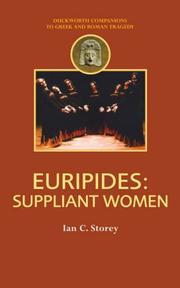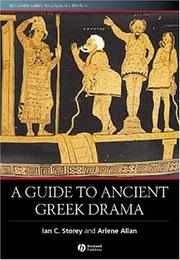| Listing 1 - 6 of 6 |
Sort by
|

ISBN: 0199259925 0191717428 Year: 2003 Publisher: Oxford [etc.] : Oxford University Press,
Abstract | Keywords | Export | Availability | Bookmark
 Loading...
Loading...Choose an application
- Reference Manager
- EndNote
- RefWorks (Direct export to RefWorks)
Eupolis was one of the most important of Aristophanes' rivals. He wrote the same sort of topical and often indecent comedy as the surviving plays of Aristophanes. This book provides a translation of all the remaining fragments of his work and an essay on each lost play.
Greek drama (Comedy) --- Comédie grecque --- History and criticism --- Histoire et critique --- Eupolis, --- Criticism and interpretation --- Dramatists, Greek --- Lost literature --- Theory, etc. --- Comédie grecque --- Criticism and interpretation. --- Greek drama --- Greek dramatists --- History and criticism&delete& --- Theory, etc --- Eupolēs, --- Eupolidis, --- Εὔπολις, --- Athens (Greece) --- Aḟiny (Greece) --- Atene (Greece) --- Atʻēnkʻ (Greece) --- Ateny (Greece) --- Athen (Greece) --- Athēna (Greece) --- Athēnai (Greece) --- Athènes (Greece) --- Athinai (Greece) --- Athīnā (Greece) --- Intellectual life. --- Eupolis --- Greece --- Dramatists [Greek] --- Biography --- Intellectual life --- Αθήνα (Greece) --- Greek & Latin Languages & Literatures --- Languages & Literatures

ISBN: 071563626X 9780715636268 1472521161 1472521153 1472539796 9781472521156 9781472539793 9781472521163 Year: 2008 Publisher: London Bloomsbury
Abstract | Keywords | Export | Availability | Bookmark
 Loading...
Loading...Choose an application
- Reference Manager
- EndNote
- RefWorks (Direct export to RefWorks)
"Euripides' 'Suppliant Women' is an unfairly neglected master work by the most controversial of the three great tragedians of Ancient Greece. It dramatises the story of one of the proudest moments in Athenian mythical history: the intervention of These us in support of international law to force the burial of the Argives who were killed during their attack on Thebes. But Euripides adds new characters to the story and presents the myth in a different and sometimes ambiguous light. A sense of uncertainty and undercutting pervades this play, which dramatises the sufferings of the innocent in war and then at the end foretells more war. As well as presenting a scene-by-scene analysis, this book will discuss the date and background of the play, whether people and events from contemporary Athens can be glimpsed in the drama; the problems of staging, and finally the story in later tradition. "--Bloomsbury Publishing Euripides' "Suppliant Women" is an unfairly neglected master work by the most controversial of the three great tragedians of Ancient Greece. It dramatises the story of one of the proudest moments in Athenian mythical history: the intervention of Theseus in support of international law to force the burial of the Argives who were killed during their attack on Thebes. But Euripides adds new characters to the story and presents the myth in a different and sometimes ambiguous light. A sense of uncertainty and undercutting pervades this play, which dramatises the sufferings of the innocent in war and then at the end foretells more war. As well as presenting a scene-by-scene analysis, this book will discuss the date and background of the play, whether people and events from contemporary Athens can be glimpsed in the drama; the problems of staging, and finally the story in later tradition
Book
ISBN: 9780674996625 0674996623 9780674996632 0674996631 9780674996779 0674996771 Year: 2011 Volume: 513, 514, 515 Publisher: Cambridge : Harvard University Press,
Abstract | Keywords | Export | Availability | Bookmark
 Loading...
Loading...Choose an application
- Reference Manager
- EndNote
- RefWorks (Direct export to RefWorks)
PHILONICUS, PHILONIDES, PHILYLLIUS, PHRYNICHUS, PLATON, POLIOCHUS, POLYZELUS, SANNYRION, STRATTIS, SUSARION, TELECLIDES, TELESTES, THEOPOMPUS, THUGENIDES, XENOPHILUS, XENOPHON
Book
ISBN: 9781350020221 9781350020214 9781350020245 9781350020238 1350020214 1350020222 1350020230 1350020249 Year: 2019 Publisher: London Bloomsbury Academic
Abstract | Keywords | Export | Availability | Bookmark
 Loading...
Loading...Choose an application
- Reference Manager
- EndNote
- RefWorks (Direct export to RefWorks)
"This is the first volume dedicated to Aristophanes' comedy Peace that analyses the play for a student audience and assumes no knowledge of Greek. It launches a much-needed new series of books each discussing a comedy that survives from the ancient world. Six chapters highlight the play's context, themes, staging and legacy including its response to contemporary wartime politics and the possible staging options for flying. It is ideal for students, but helpful also for scholars wanting a quick introduction to the play.Peace was first performed in 421 BC, perhaps only days before the signing of a peace treaty that ended ten years of fighting between Athens and Sparta (the Archidamian War). Aristophanes celebrates this prospect with an imaginative fantasy involving his hero's flight on a gigantic dung-beetle to Olympus, the rescue of the goddess Peace from her imprisonment in a cave, and her return to a Greece weary of ten years of war. Like most of the poet's comedies, this play is heavy on fantasy and imagination, light on formal structure, being an exuberant farce that champions the opponents of War and celebrates the delights of the return to country life with its smells, food and drink, its many pleasures and none of the complications that war brings in its wake."-- Back cover.
Comparative literature --- Aristophanes [Comicus] --- Greek drama (Comedy) --- History and criticism --- Aristophanes. --- Aristophanes comicus --- Aristophanes --- Aristofan --- Arystofanes --- Aristophane --- Aristofane --- Arisutopanesu --- Arisutofanesu --- Aristófanes --- Aristophanes Comicus --- אריסטופאנוס --- אריסטופאנס --- אריסטופאנס. כספי זיוה --- אריסטופניס --- אריסטופנס --- Ἀριστοφάνης
Book
ISBN: 1118455126 1306118743 178684222X 1118455118 1118455142 1118455134 9781118455128 Year: 2014 Publisher: Chichester Wiley Blackwell
Abstract | Keywords | Export | Availability | Bookmark
 Loading...
Loading...Choose an application
- Reference Manager
- EndNote
- RefWorks (Direct export to RefWorks)

ISBN: 1405102144 1405102152 Year: 2005 Publisher: Malden Oxford Carlton Blackwell Publishing
Abstract | Keywords | Export | Availability | Bookmark
 Loading...
Loading...Choose an application
- Reference Manager
- EndNote
- RefWorks (Direct export to RefWorks)
Greek drama --- History and criticism --- Greek literature --- Handbooks, manuals, etc.
| Listing 1 - 6 of 6 |
Sort by
|

 Search
Search Feedback
Feedback About UniCat
About UniCat  Help
Help News
News